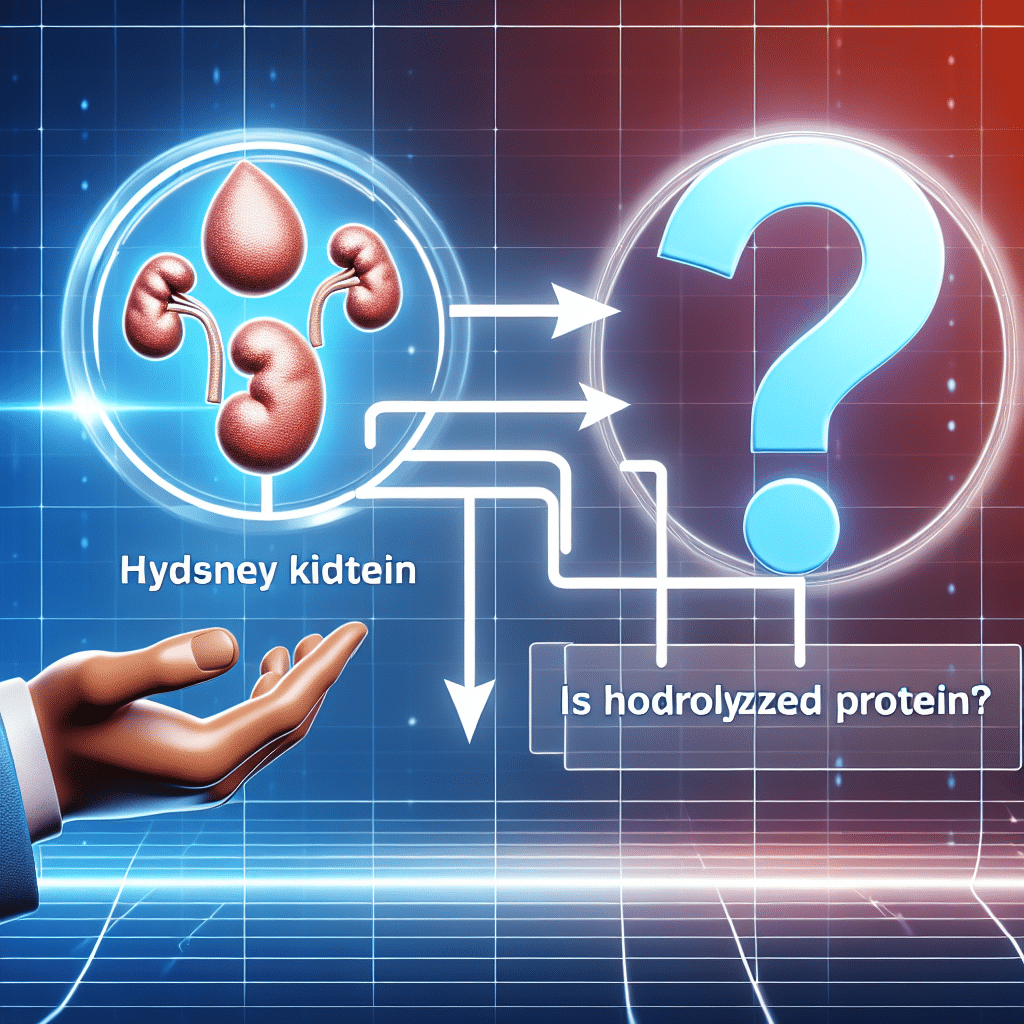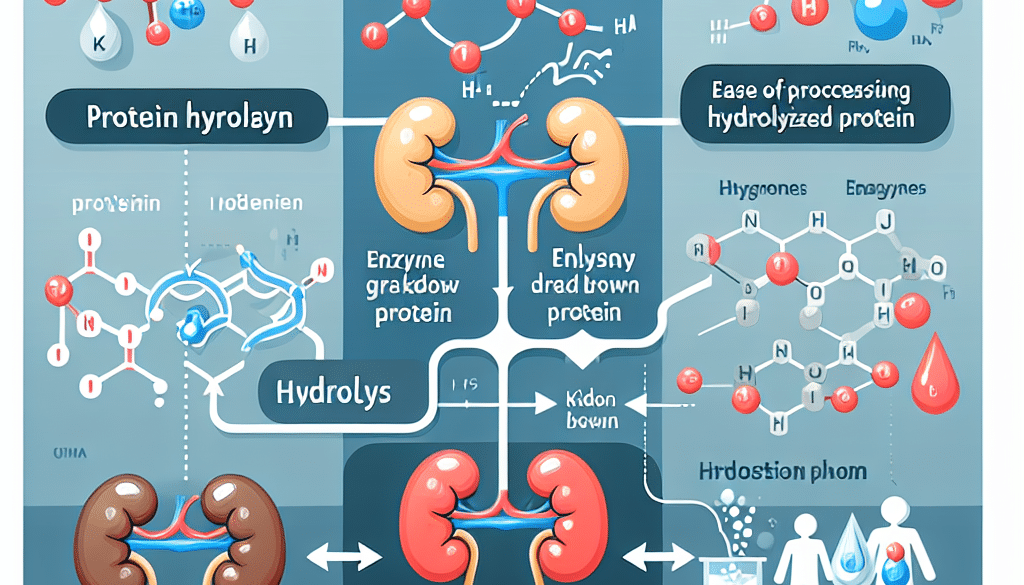Is hydrolyzed protein gentler on kidneys? Overview
Table of Contents
- Hydrolyzed Protein and Kidney Health: A Detailed Analysis
- Understanding Kidney Function and Protein Metabolism
- What is Hydrolyzed Protein?
- The Potential Benefits of Hydrolyzed Protein for Kidney Health
- Research on Hydrolyzed Protein and Kidney Function
- Hydrolyzed Protein in Clinical Settings
- Considerations for Choosing Hydrolyzed Protein
- Hydrolyzed Protein and Diet Planning
- Conclusion: Is Hydrolyzed Protein Easier On Kidneys?
- Discover ETprotein’s High-Quality Protein Products
Hydrolyzed Protein and Kidney Health: A Detailed Analysis

Protein is a vital nutrient essential for the growth, repair, and maintenance of body tissues. However, for individuals with kidney disease, protein intake must be carefully managed. Hydrolyzed protein, which is protein that has been broken down into smaller peptides or amino acids, is often suggested as a more kidney-friendly option. This article explores whether hydrolyzed protein is indeed easier on the kidneys and what implications this has for dietary choices.
Understanding Kidney Function and Protein Metabolism
The kidneys are critical organs that filter waste products from the blood, including those produced during protein metabolism. When protein is consumed, it is broken down into amino acids, which are then used to build new proteins or are converted into energy. The byproducts of this process, such as urea, must be eliminated by the kidneys. In individuals with compromised kidney function, reducing the workload on the kidneys can be beneficial.
What is Hydrolyzed Protein?
Hydrolyzed protein is created through a process called hydrolysis, where water molecules are used to break the peptide bonds in proteins, resulting in smaller chains of amino acids. This pre-digestion process can make proteins easier to absorb and may reduce the metabolic strain on the kidneys.
The Potential Benefits of Hydrolyzed Protein for Kidney Health
There are several reasons why hydrolyzed protein may be considered easier on the kidneys:
- Improved Absorption: Because hydrolyzed proteins are already broken down, they can be absorbed more quickly and efficiently, potentially reducing the production of nitrogenous waste.
- Lower Phosphorus Content: Some hydrolyzed protein products have lower phosphorus levels compared to whole proteins, which is beneficial for kidney health as high phosphorus can be harmful to damaged kidneys.
- Reduced Allergenicity: Hydrolyzed proteins are often less allergenic, which can be important for individuals with kidney disease who may also have food sensitivities.
Research on Hydrolyzed Protein and Kidney Function
Several studies have investigated the effects of hydrolyzed protein on kidney function. For example, research has shown that hydrolyzed protein diets may lead to lower levels of urea and creatinine in the blood, indicating a reduced burden on the kidneys. However, it is important to note that research is ongoing, and recommendations can vary based on individual health status and the stage of kidney disease.
Hydrolyzed Protein in Clinical Settings
In clinical settings, especially for patients with acute or chronic kidney disease, healthcare providers may recommend hydrolyzed protein supplements. These supplements can help meet protein needs without overtaxing the kidneys. Case studies have demonstrated the effectiveness of hydrolyzed protein in managing kidney disease, but individual results can vary.
Considerations for Choosing Hydrolyzed Protein
When considering hydrolyzed protein, it’s important to look at the source of the protein, the degree of hydrolysis, and the overall nutritional profile. Not all hydrolyzed proteins are created equal, and some may be more suitable for individuals with kidney concerns than others.
Hydrolyzed Protein and Diet Planning
For those with kidney disease, working with a dietitian or healthcare provider is crucial to create a diet plan that includes the right type and amount of protein. Hydrolyzed protein can be a part of this plan, but it should be balanced with other nutritional needs and considerations.
Conclusion: Is Hydrolyzed Protein Easier On Kidneys?
In conclusion, hydrolyzed protein can be easier on the kidneys due to its improved absorption and potentially lower phosphorus content. However, the decision to include hydrolyzed protein in the diet should be made on a case-by-case basis, considering the individual’s health status and kidney function. It is essential to consult with healthcare professionals to determine the best dietary approach for kidney health.
Discover ETprotein’s High-Quality Protein Products
If you’re looking for high-quality hydrolyzed protein options, ETprotein offers a range of products that may be suitable for those with kidney concerns. Their organic and non-GMO protein powders, including rice, pea, and seed-based proteins, are designed to meet various dietary needs. With a commitment to purity and quality, ETprotein’s offerings can be a valuable addition to a kidney-friendly diet.
About ETprotein:
ETprotein, a reputable protein and L-(+)-Ergothioneine (EGT) Chinese factory manufacturer and supplier, is renowned for producing, stocking, exporting, and delivering the highest quality organic bulk vegan proteins and L-(+)-Ergothioneine. They include Organic rice protein, clear rice protein, pea protein, clear pea protein, watermelon seed protein, pumpkin seed protein, sunflower seed protein, mung bean protein, peanut protein, and L-(+)-Ergothioneine EGT Pharmaceutical grade, L-(+)-Ergothioneine EGT food grade, L-(+)-Ergothioneine EGT cosmetic grade, L-(+)-Ergothioneine EGT reference grade and L-(+)-Ergothioneine EGT standard. Their offerings, characterized by a neutral taste, non-GMO, allergen-free attributes, with L-(+)-Ergothioneine purity over 98%, 99%, cater to a diverse range of industries. They serve nutraceutical, pharmaceutical, cosmeceutical, veterinary, as well as food and beverage finished product distributors, traders, and manufacturers across Europe, USA, Canada, Australia, Thailand, Japan, Korea, Brazil, and Chile, among others.
ETprotein specialization includes exporting and delivering tailor-made protein powder and finished nutritional supplements. Their extensive product range covers sectors like Food and Beverage, Sports Nutrition, Weight Management, Dietary Supplements, Health and Wellness Products, and Infant Formula, ensuring comprehensive solutions to meet all your protein needs.
As a trusted company by leading global food and beverage brands and Fortune 500 companies, ETprotein reinforces China’s reputation in the global arena. For more information or to sample their products, please contact them and email sales(at)ETprotein.com today.














